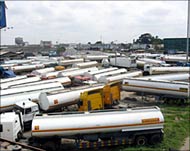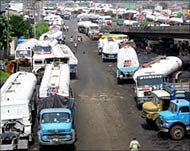Protesters fired at in Nigeria
Nigerian police sparked panic on Wednesday as they fired live rounds and tear gas to break up clashes and rallies in the country’s main cities on the third day of a strike called to protest agaist a fuel hike.
 |
|
Empty petrol tankers are parked |
In the capital Abuja, police fired tear gas into the main market, triggering a stampede as strikers clashed with traders trying to reopen their stalls on the third day of the general strike, according to witnesses.
In Lagos, the commercial hub of the West African nation, police fired live rounds as warning shots in a busy market as members of the Nigeria Labour Congress (NLC) tried to stage a demonstration.
There were no reports of casualties.
Strikers also dragged commuters out of buses as they tried to enforce a public transport strike that has forced hundreds of people to trek long distances to work.
Traders in the Wuse market in Abuja said that NLC activists had arrived in the market at mid-morning and tried to force stall-owners to shut up their stalls. As arguments broke out, police fired gas, clearing the market.
The NLC has accused the police of brutality after they used gas to break up a rally on Tuesday and severely beat three journalists covering the protest.
Dialogue
 |
|
NLC strikers vowed to continue |
Union leaders were due to restart talks with President Olusegun Obasanjo’s government in an attempt to have the fuel price increase dropped.
Many banks and offices remained shut and NLC strikers barricaded the entrance to Nigeria’s main port complex, Apapa, in Lagos. In Abuja, many government offices were empty or occupied by strikers.
Strike leader Adams Oshiomhole, President of the NLC, warned the government not to count on the strikers’ will weakening.
“Prolonging the talks will make the workers angry, not wear them out. For now the strike continues,” he said late on Tuesday after most recent round of talks.
But he indicated that some kind of compromise was near.
“There’s an indication that there will be positive developments. The progress so far has been sufficient for us to continue discussion,” said the NLC President.
So far, the strikers’ have failed to shut down Nigeria’s single most important industry, oil production and export, which accounts for 96 percent of foreign revenue.
Nigeria is the world’s fifth largest exporter of crude oil and any disruption to exports could send world prices soaring.
The strike was called after Obasanjo announced the end of the government’s subsidy on retail fuel prices, effectively raising the pump price of petrol by 54 percent.